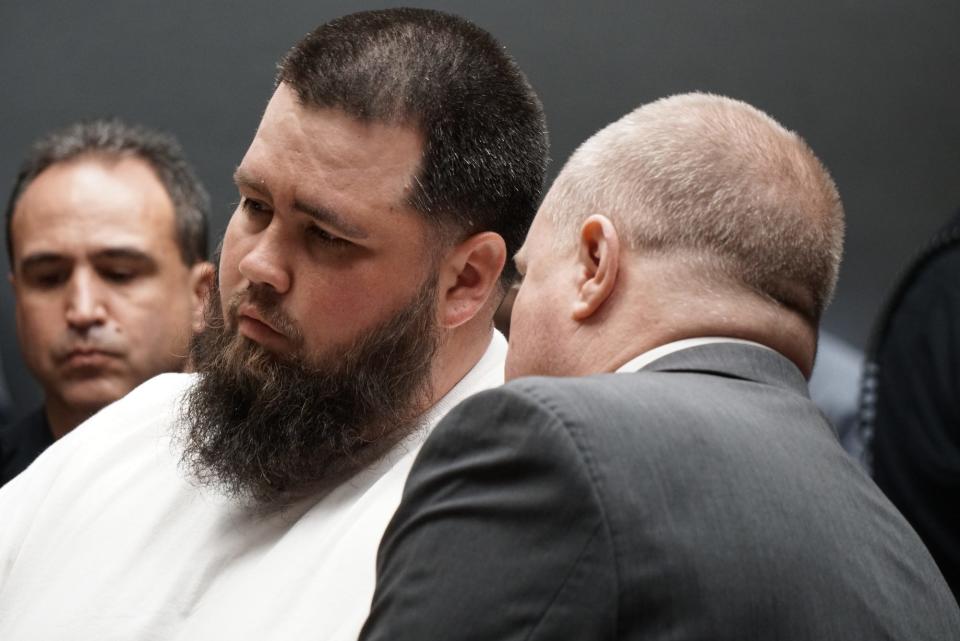RI Supreme Court upholds suppression of wiretap evidence in motorcycle gang investigation
PROVIDENCE — The state Supreme Court on Thursday upheld the suppression of crucial wiretap evidence in a sprawling investigation targeting alleged drug dealing and weapons violations by a motorcycle gang.
The high court in a 29-page opinion ruled that Superior Court Judge Netti C. Vogel got it right when she suppressed the wiretap of alleged Pagans Motorcycle Club leader Deric “Tuna” McGuire's phones.
Vogel determined after a hearing in 2019 that under state law only the Superior Court's presiding justice or the next-senior Superior Court judge can authorize such interceptions. That decision led to the suppression of key evidence in McGuire’s case and 23 others.
“Accordingly, in the face of invalid wiretap orders, suppression of the evidence is the appropriate remedy. Consequently, there was no error in the trial justice’s finding that the evidence derived from the invalid wiretap orders must be suppressed,” Justice Maureen McKenna Goldberg wrote.
Courts and crime: Alleged leader of outlaw Pagans motorcycle gang returns to prison after violating bail

The Supreme Court rejected the state's arguments that Vogel was misreading the law in invalidating the warrants.
"We reiterate that the wiretap act authorizes only the presiding justice or the senior associate justice whenever the presiding justice 'shall deem it necessary to disqualify himself or herself[,]' and no one else. ... Therefore, only those two individuals are vested with the statutory authority to issue wiretap orders," the court said.
By the court's reading, state law empowers only Superior Court Presiding Justice Alice B. Gibney and her second-in-command, Justice Robert D. Krause, to consider wiretap applications. It was Judge Melanie Wilk Thunberg who signed off on several of the applications under Gibney's direction while she was on medical leave.
The Supreme Court heard arguments in late February.
It was unclear immediately Thursday what impact the ruling will have on the cases. Several people facing charges were released on bail after Vogel's ruling.
"Today's decision in this important case for public safety is a disappointment to this Office," Blake Collins, spokesman for Attorney General Peter Neronha, said in an email. "In 2017, prosecutors seeking court authorization for a wiretap followed the direction of the Superior Court to the letter regarding which Superior Court justice they should seek approval from. They did so in good faith and could take no other path in seeking such authorization. That said, we respect the Court's decision and will reevaluate the cases in light of it."
For almost a year, state and federal agents wiretapped at least seven different telephones used by McGuire, capturing, they say, his recruitment to lead a new Rhode Island chapter of the Pagans outlaw motorcycle gang and documenting his illegal drug operation.
Previous reporting: RI Supreme court to decide if wiretap evidence against biker gang was wrongly suppressed
The investigation, dubbed Operation Patched Out, led to 29 raids by the Rhode Island State Police in May 2018 and the seizure of drugs and weapons, including a rocket launcher. Fifty people were arrested and charged with crimes, authorities say, tied to two Woonsocket-based motorcycle gangs, the Pagans and the Kryptmen. It led to the indictment of 41 people on 424 counts.
McGuire’s lawyer John F. Cicilline challenged the validity of the wiretap warrants, because state law specifies that only Presiding Justice Gibney or the most-senior Superior Court judge, in this case Krause, in Gibney's absence, can sign a wiretap warrant. Instead, Thunberg had approved many of the warrants at Gibney’s request while she was on medical leave.
A year ago: State Supreme Court says motorcycle gang leader's appeal is premature
Gibney asked Thunberg to handle the wiretap applications in the Pagans case because she believed it would have created a conflict for Krause to handle the warrants and then later preside over the cases in gun court. Krause handles many of the state’s most serious firearms cases. She directed state prosecutors to bring the applications to Thunberg, the ruling states.
Wiretap applications are highly restricted under state a federal law due to intrusion on personal communications and privacy, rights protections considered "sacrosanct."
Thunberg, the court said, was not vested with the statutory authority to administer and sign the wiretap orders issued on Aug. 2, 2017, and thereafter. Vogel had correctly concluded that these orders were in violation of the wiretap act.
"Thus, we conclude that the wiretap orders were invalid, and, consequently, the interception of communications pursuant to those orders amounted to 'unauthorized intrusions' into these defendants’ private communications," the court said.
The high court declined to adopt the "good-faith" exception requested by the state.
McGuire, 37, and his wife, Catherine Glaude, 31, who is also facing charges, both of North Smithfield, had been free on home confinement following Vogel’s ruling, but were returned to prison in January for violating their release terms by consorting with alleged motorcycle gang members.
This article originally appeared on The Providence Journal: RI high court upholds suppression of evidence in motorcycle gang case

